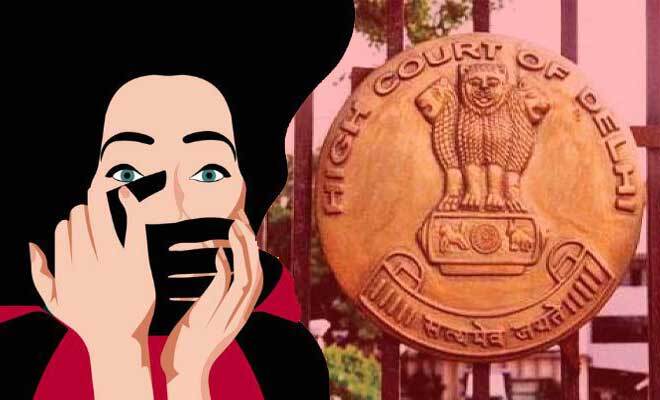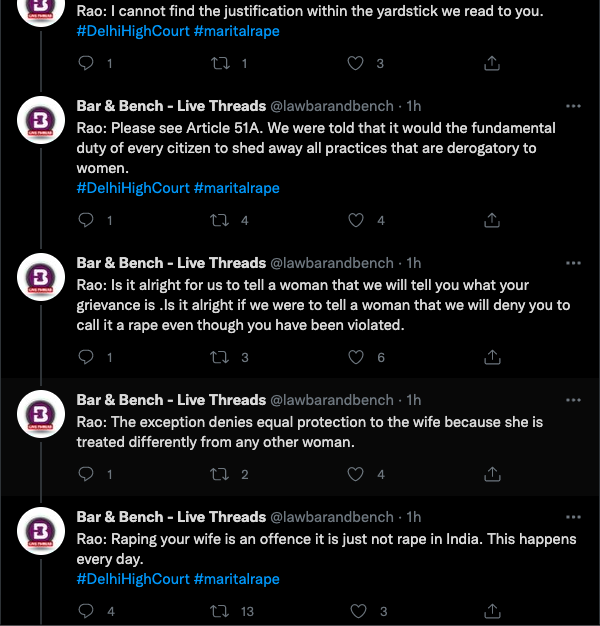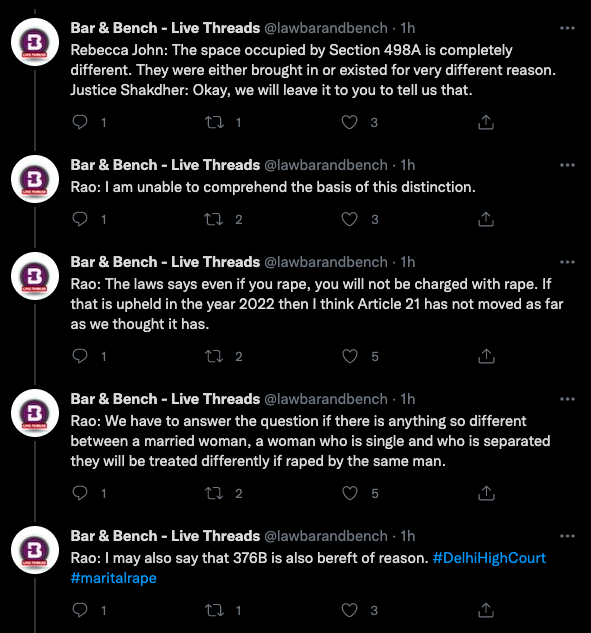Delhi HC Questions Why Married Women Can’t Say ‘No’, Amicus Curiae Supports Criminalising Marital Rape

So, I was just browsing through the internet and I realised that #maritalrape is trending AF on social media. And here’s the thing, marital rape is currently being discussed in Delhi High Court and we’re seeing a lot of positivity in terms of criminalising it. It’s only fair that we do this now. Time and again we have discussed how painful it is for a woman to wake up in the morning and serve breakfast to her rapist. Now, this may sound very cliched but this is the brutal truth of our society.
The Delhi High Court is currently in the process of hearing a batch of petitions filed by NGOs seeking to strike down the exception from prosecution given to husbands under section 375 of the Indian Penal Code. Under these exceptions, husbands are protected from the charges of marital rape even if they have forcible sexual intercourse with their wives against her consent (which is essentially rape). The petitions that are seeking criminalisation of marital rape were filed by NGOs – RIT Foundation and All India Democratic Women’s Association.
Justice Shankar: Let us assume that no provision were present for wife to prosecute her husband. I am in no doubt that it should be a punishable offence. Assume there is not provision under which she can punish him. Is that a ground for us to strike down the provision?
— Bar & Bench – Live Threads (@lawbarandbench) January 13, 2022
During the argument in court, Senior Advocate Rajshekhar Rao, who is appearing as amicus curiae in the matter as reported by LiveLaw, told the bench of Justices Shakdher and Shankar that in his opinion the exception to section 375 of the IPC should be struck down in order to protect married women. For the uninitiated, Amicus Curiae is a person who acts as an impartial advisor to the court in a case. Arguing in favour of criminalising marital rape, Rao said that a woman is better off being assaulted by a stranger because when it’s a loved one doing it, she does not even have the right to call rape, rape. He further added that while Indian Courts have already established that rape dehumanizes women, why are the same Courts sitting back and watching as an exception to this law allows the ‘possibility of a woman being dehumanised every day’. He also said that the law has always placed greater responsibility on the shoulders of people who have a fiduciary relationship but at the same time it allows a woman to be violated by a person who is supposed to be her companion and protect her as he has is in a fiduciary capacity.
During the hearing, the Delhi High Court raised some much-needed questions. The bench asked if being married takes away a woman’s right to say ‘no’. It further wondered how rape affects the dignity of a married and unmarried woman while asserting that marital status should not be a factor when it comes to consent and that every woman should have the right to say ‘no’ to an act of non-consensual sex (aka rape). The bench of Justices Rajiv Shakdher and C Hari Shankar pointed out that this exception to the law not only protects the husbands from prosecution but it has also created a ‘firewall’ which actually violates articles 14 and 21 of the Indian Constitution that give every citizen the right to equality before and protection of life and personal liberty respectively.
The advocate representing the Delhi government argued that married women always have the option to seek remedy to divorce her husband on the grounds of cruelty and other such personal as well as criminal laws while adding that the exception to section 375 does not violate the right to privacy, dignity or sexual autonomy because the woman always has a remedy.
In response to this, the Delhi High Court pointed out that it’s not right to say that a married woman cannot be protected from marital rape just because she can take recourse to other civil and criminal laws apart from rape. Speaking about it, the HC said, “Why is it so different from an unmarried woman? It affects an unmarried woman’s dignity but it does not affect the dignity of a married woman How is it? What is the answer to this? Does she lose her right to say ‘no’? Have 50 countries (which have made marital rape an offence) got it wrong?”
Also Read: Delhi High Court On Marital Rape: “Qualitative Difference” Between Marital And Non-Marital Relationship Provide Husband With Protection From Rape Charges
Examining the problems in the exception, Justice Shakdher said that he finds it ‘difficult to appreciate’ that the exception does not violate Article 21 of the Indian Constitution just because a woman has other remedies. He then went on to raise a question that is food for thought. “Imagine a woman is on her menstrual cycle and she refused to have sex but the husband still forces himself and brutalises her. Isn’t it an offence?” he asked. Responding to the question the counsel for the Delhi government said that it is an offence but it does not come under the ambit of rape laws for married women. The judge went on to question the same and pointed out that it is not okay to say that it’s not an offence just on the basis of a relationship. The bench also added that the foundation of a marriage is based upon a joyous relationship between two parties and if there is joyful consent there is no offence.
Personally, I will take this as a win for the women. While I do agree that this opens up men to the offence of marital rape, we need to understand that a husband is responsible for protecting his wife and her honour. And what happens when the same man who is supposed to protect a woman goes on and violates not just her body and rights but also her trust? How is a woman expected to wake up the next morning and trust this man to protect her when he is the abuser himself? I am so so glad that the Delhi HC has made these landmark and progressive statements in favour of women and raised just the right questions.
Gujarat High Court On Marital Rape: Marriage Is Not Irrevocable Consent, High Time To Reconsider




















